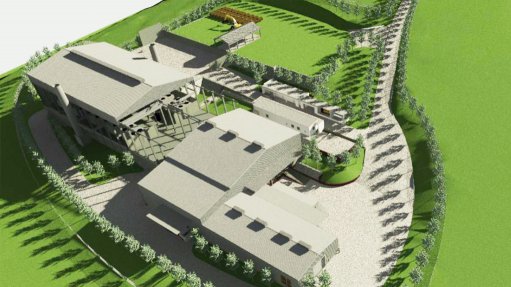
An artist's rendering of the Toronto Group's Charcoal Production Facility once completed.
Western Cape-based Toronto Group on August 18 launched its charcoal production facility, in the Swartland municipality of the province.
The combined virtual and limited attendance sod-turning ceremony was hosted by information bureau Wesgro.
The first-of-a-kind charcoal manufacturing plant is set to produce 10 000 t/y of export-grade charcoal from biomass from invasive alien vegetation, which is mainly harvested under the auspices of the Working for Water Programme to enhance the flow of water in riparian zones.
The source of raw material will be invasive species Blue Gum (Eucalyptus) and Black Wattle (Acacia), and products will include lump wood charcoal, biochar as a by-product, and activated carbon.
The products will be 100% exported, with regions such as the UK and Europe being considered as potential export markets.
Toronto Group CEO Phillip Mulungo said the facility is carbon-neutral and explained that the company complies with the Forest Stewardship Council (FSC) regulations, which governs the chain of custody and controlled wood to ensure traceable wood sources.
“Our FSC certification ensures that we supply our markets with the best quality products from traceable and trusted sources and foster sustainable development without damage to the environment,” he noted.
Engineering, procurement and construction (EPC) company Lesedi Nuclear Services is the EPC representative and was appointed in January to design, manage, commission and fully integrate the production facility.
The completion of the 3 040 m2 manufacturing plant is expected to take about eight months, with first production expected during the first quarter of 2021, Mulungu said in response to questions by Engineering News.
The facility will create about 150 direct and 75 indirect job opportunities through the value chain.
Trade, Industry and Competition Deputy Minister Fikile Majola officiated the soil-turning ceremony and said the Department of Trade, Industry and Competition’s (DTIC’s) work will be to continue supporting non-financial support to the Toronto Group in addition to the R50-million capital supplement provided by the DTIC.
“It is through proper coordination and collaboration that service delivery will be improved, and our people will begin to have better access to social and economic opportunities and choices,” he said.
Majola added that, despite the weak economic outlook brought about by the Covid-19 pandemic, government’s reconstruction and recovery plan with prioritise broader pacts with workers and businesses, focused on saving as many companies and jobs as possible, while also identifying new opportunities and addressing economic inclusion with greater urgency.
“Government will continue to unlock the potential of black industrialists through initiatives such as the Black Industrialists Programme and its subsidiary, the Black Industrialists Scheme (BIS).”
He further said that through the BIS support, Toronto will be able to implement its greenfield charcoal plant.
Toronto Group has so far created five direct jobs and is projected to create 90 jobs by December, plus additional indirect job opportunities through its sourcing of raw materials from local suppliers.
Meanwhile, in 2018, following a severe three-year drought, the City of Cape Town faced the possibility of running out of water. Only through improving the Western Cape’s water resilience in the face of climate change, and through ensuring diverse water sources, as part of the Cape Town Water Strategy was the province able to avoid this fate.
The clearing of invasive alien vegetation is included as an intervention of the strategy and Swartland municipality executive mayor Alderman Tijmen van Essen explained on August 18 that “clearing invasive alien plants in the catchments of the major dams supplying Cape Town offers multiple social, economic and environmental benefits”.
“We are proud to form part of the Western Cape’s solution for future water resilience and contribution to job creation in the Swartland municipality.”